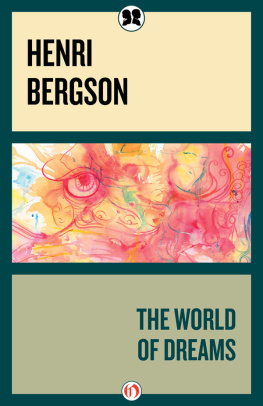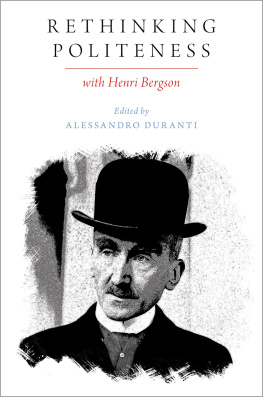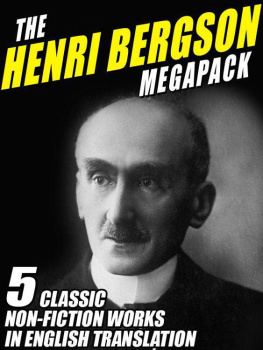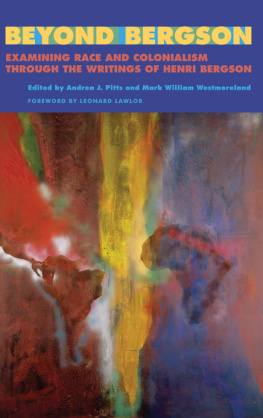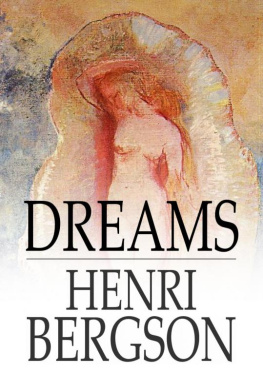The Philosophy of Poetry
The Genius of Lucretius
Henri Bergson

Preface
This brief volume offers an insight into the workings of the minds of two titans separated in time by a gap of more than two thousand years but bound in spirit by an intuitive grasp of the underlying pattern of evolutionary processes and by an awesome appreciation of their outward manifestations.
Lucretius (Titus Lucretius Carus, c. 98-55 B.C.), who painted a matchless portrait of man and the cosmos in his explanation of the philosophical system of Epicurus (c. 342-270 B.C.), is now ranked among the outstanding poets of all time. Milton, Tennyson, Shelley and Whitman are numbered among those who have drawn attention to the life and work of the poet whose tense, electric De Rerum Natura (On the Nature of Things) is the confession of a mind tormented by violent passions and obsessed by a longing for philosophical calm. According to Saint Jerome (c. 340-420 A.D.) , Lucretius in a fit of insanity took his own life. Though one account is probably apocryphal, it is easy to conclude that Lucretius would have elected to die by suicide if he had felt at any time that he had lost forever the one thing that made life bearable, tranquility of mind.
Henri Bergson (1859-1941) is perhaps Lucretius most articulate interpreter. Born in Paris during the year of the publication of the Origin of Species, he belonged to a generation strongly influenced by Darwins theory of evolution. After graduating from the Ecole Normale, he taught at lyces in Angers, Clermont, and Paris before returning to his alma mater as a professor in 1898. He is best remembered in connection with the Collge de France, where he began lecturing in philosophy in 1900. Just before the outbreak of World War I, he lectured in the United States and in England. He was the recipient of the Nobel Prize for literature in 1928. The latter part of his life was devoted to the promotion of international harmony and understanding. During World War II, he climaxed a unique career by refusing to compromise on principle when the Vichy government, in deference to his international fame, offered to exempt him from its Jewish laws.
In his edition of De Rerum Natura, published in 1884 while he was teaching in the Blaise Pascal Lyce in Paris, he set down some germinal ideas that were to be developed subsequently in better-known works. His edition of the poem (published under the title Extraits de Lucrce, with a commentary, and notes, and with a study of the poetry, physics, text and language of Lucretius) deserves far greater recognition and study than it has hitherto received, both because of its intrinsic merits and because of the insight which it gives into Bergsons thinking during this early period of his life. His dissatisfaction with the materialistic orientation of his generation, implicit in his study of Lucretius, was explicitly stated in his French dissertation on the immediate data of consciousness; this dissertation, completed four years later and subsequently published in English as Time and Free Will, is a milestone in the history of modern philosophy. His revolt against materialism culminated in his enthralling Creative Evolution, the first philosophical masterpiece of the twentieth century and the work which made him almost overnight the most popular philosopher that the modern world has produced.
Bergson published his edition of De Rerum Natura at the early age of twenty-five. From his discussion of the diverse facets of Lucretius genius it is clear that his deep-rooted admiration at times bordered on awe, and that this feeling was due largely to the similarity between the concepts, methodology and style brought to fruition in such works as Creative Evolution and those same facets of Lucretius genius as revealed in his Latin poem. It is possible that Bergson eulogized Lucretius, not because materialism and mechanism were exerting their characteristic pull on youth, but because he glimpsed in the poets writings a first step toward the resolution of the antinomies that were to claim his attention for years to comedeterminism and choice, matter and life, body and mind. Two important concepts developed more fully in later works such as Creative Evolution (1907), Mind-Energy (1919), and The Creative Mind (collected essays first published in English in 1946), are worth examining in connection with Bergsons remarks about Lucretius philosophical poem. They are his concept of entelechy and his concept of intuition.
Entelechy is distinct from both mechanism and finalism. Mechanism assumes that natural processes act blindly and are beyond the control of individual organisms; finalism assumes that these are directed toward an end by an outside force. Entelechy, however, assumes an inward determination; the function and purpose of the whole organism determines the overall design or pattern of its development.
Though Darwins Origin of Species had a profound effect on Bergsons contemporaries, it failed to discredit the prevailing philosophical system; it was simply fitted into the general scheme of mechanism. Bergson was allying himself more closely with Lamarck than with Darwin in saying that the animal that had sufficient energy and talent to become a man was already a man. He echoed the same thought in pointing out that behind the divergent manifestations of natural phenomena were distinct evolutionary patterns.
From the mechanistic viewpoint of Herbert Spencer, Darwins interpreter, accidental variations among living organisms enable some individuals to survive where others perish. Physical conditions alone determine the course of evolution. Living matter itself is but a haphazard arrangement of elements. Purposefulness, choice and direction have no part in his scheme of evolution. Lucretius, too, referred to the blind, inexorable laws of nature; but he had also glimpsed with a poets eye the ultimate beauty of natures creations. Bergsons remarks show that he conceived of nature, not as being forever held in check by mechanical repetition, but as forever creating something new. It is also significant that in this early work he looked upon the evolution of man as a struggle that involved both his intelligence and his will.
Darwins theory of evolution pointed to the conclusion that flux (or becoming), not being, is the essence of reality. Though Bergsons ideas on the subject were not elaborated until years later, his study of Lucretius clearly indicates the direction his thought was to take. In it he referred, for instance, to the noble anxieties of man. Mans anxiety is a product of his freedom; the ability to go through the process of choosing, even if the final choice in retrospect seems fixed by external circumstances, sets man above the beast; it causes anxiety, for it is creation, and creation is toil.
That Lucretius could make his discoveries despite his shortcomings as a physicist (for instance, his ignorance of scientific method) obviously appealed to Bergson. Characteristically, he refrained from making any attempt to refute Lucretius system; to him philosophy was a deliberate attempt to grasp the immediate data of consciousness; many thinkers had contributed a modicum of truth to the cumulative store of knowledge; the important thing was to recognize and use the contribution of each. One of the Latin poets contributions was his concept of perpetual evolution in accordance with natural laws, and his contribution was made possible only by his ability to discern behind the manifold and multidirectional manifestations of nature the flux which is the essence of reality.


